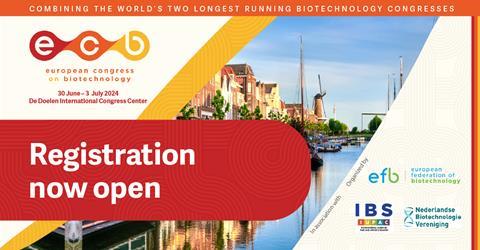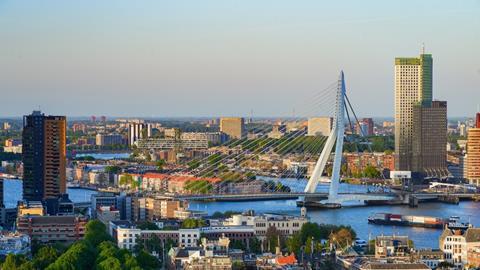From June 30 - July 3, the international biotechnology community gravitates towards The Netherlands as Rotterdam is hosting the European Congress on Biotechnology (ECB). An event to look forward to, not in the least for the editors of C2W International. That is why we are gathering tips from those-in-the-know on what not to miss during ECB 2024.
Anyone who has ever participated in a multi-day international conference knows that you almost need a navigation tool to find your way through the maze of lectures, workshops and social activities. One approach is to stick to familiar terrain and choose those sessions that match your own specialization, but meetings like this also offer a great opportunity to dive into completely new topics and research areas.
To help you get started, and spark your interest, we will be gathering tips from insiders. We will add new ideas and suggestions on a continuous basis, so check in regularly to stay up-to-date on what not to miss during ECB 2024.
What are they looking forward to at ECB 2024?
Marjan De Mey, Professor, Metabolic Engineering of Microorganisms Group, UGent:
‘The ECB in itself is a good congress because it is very broad: all areas of biotechnology are covered, this year in the form of the grand challenges. It is very inspiring to see the spill-over between these different fields, to see how the same technique is applied differently in other places. Also, you see both academics and industrial players at the congress, so both the push and the pull.
My background is in industrial biotechnology. Keynote speakers such as Akihiko Kondo and Ralf Takors are something I look forward to from that perspective. Kondo will be talking about the development of integrated biofoundries, automated and standardised systems for the very rapid production and screening of different mutants. There has been a lot of focus on this recently, but scaling up is still a challenge, so I am very interested to see how this area develops. Takors, for his part, is looking at how to scale up E. coli to industrial levels. So there is a lot of research going on to bridge the gap between the lab and the production unit.
Other research trends include moving away from glucose as a carbon source for microorganisms by switching to used biomass that does not compete with food, and moving away from model organisms. For certain processes, E. coli or S. cerevisae are not always the best choice, so new model organisms have to be found. This is something that keynote speaker Pablo Nikel is doing, particularly with Pseudomonas.
Looking outside my own bubble, I see very interesting things happening in marine biotechnology. I am very curious to see the state of the art and how they are dealing with microorganisms in such a salty environment. It is a very big congress, so it is good to do your homework so you know where to go. Then, during the coffee breaks, you don’t join groups with your “own field”, but actually come into contact with all these different profiles. That’s where the innovation happens.’
Peter-Leon Hagedoorn, Associate Professor of Biotechnology, TU Delft:
‘First of all, the venue, De Doelen, in the centre of Rotterdam near the central station, is fantastic. It offers a great opportunity for everyone – national and international – to be fully immersed in the latest developments in the field. I am very interested in enzymes myself, and on Thursday in the Frontiers in Biotechnology section you will find a nice programme around enzyme design and engineering, including a talk by Ulrich Schwaneberg from the University of Aachen. He is a very big player in this field when it comes to applications in the chemical industry, so I really expect new developments for realistic applications of enzymes in industry.
Other tips would be the closing plenary talk by our own John van der Oost, one of the pioneers in the field of CRISPR-Cas, and the topic of biotechnology against climate change. The latter is all about using CO2 as a resource instead of seeing it as waste, and how biotechnology can play an important role in this.
Also, it is great to have such a big physical congress where you can bump into people after the talks and ask questions. That you can talk to people who are doing very interesting work and get into contact with them, that new collaborations might come out of it. That is really invaluable. The congress has a combination of fundamental and applied research, which is perfectly complemented by the fact that companies are very much involved in the field.’
Richard van Kranenburg, corporate scientist at Corbion and special professor of bacterial cell factories at the Laboratory of Microbiology (Wageningen University & Research):
‘Since the last ECB six years ago, I have been involved in the organisation of the next ECB. It was supposed to take place four years ago, but was postponed twice because of Covid. So it’s great that it’s finally happening after such a long time!
The great thing about ECB is that it is biotech-wide and covers all sorts of issues: health, food security, climate change. The line-up of keynote speakers is also great. Sang Yup Lee is a real hot shot in the field, as is Michael Köpke. And John van der Oost comes from our own ranks; he is a leading figure in the field of CRISPR-Cas in the Netherlands and worldwide.
As for the programme, the topics are spread across the parallel sessions, and this gives you the opportunity to get ideas in your own discipline, but also to look outside your own field for inspiration. I am very curious to see what is going on in health and plant biotechnology, as my expertise is more in industrial biotechnology.
Social interaction is also very important. At a congress like this, you talk to people you haven’t seen for a while, or you have those surprising conversations when you stand behind a stranger in the food queue.’
Carlien Verberne-van de Laak, Program Manager HAN BioCentre and Board Member of the Dutch Biotechnology Association (NBV):
’It is really great that we now how have this international event in The Netherlands, which makes it very accessible to participate. I am definitely looking forward to our NBV Highlight event, which features entrepreneur Linda Dijkshoorn of EV Biotech, amongst others.
I’m also very interested in the session on Future Protein Sources, with Corjan van den Berg as one of the speakers. Biotechnology is essential for ensuring a sustainable future and that requires smarter ways to employ micro-organisms. The presentation by Lisbeth Olsson of Chalmers University of Technology on ‘Microbial robustness: concepts, tools and applications’ is definitely on my wish list. I expect this to offer a good example of how we can apply biotechnology to the development of biobased building blocks.
As to the social programme, I really look forward to the festive dinner for NBV-members on the Monday evening. Now that we don’t have our annual NBC event this year, this will be nice way to meet everyone again and catch up.’
Tim Vos, Department Manager Biotechnology, Delft University of Technology and Board Member of the Dutch Biotechnology Association (NBV):
’I expect to get inspired by the most recent developments in biotechnology and see how these will impact societal challenges relating to sustainability. The great thing about ECB is the broad range of technologies and application areas that come together, offering a unique opportunity to meet your peers from your own international research area, but also to learn about new developments and technologies that may offer new perspectives on your line of work.
Personally, I am very interested in the current developments at LanzaTech. They focus on biotechnological solutions to recycle the carbon that is emitted by industry, such as steel production. How did they develop and scale up this technology and how did they manage to find the right partners for the next stages? Wat will be the impact in the end? These are all relevant questions that I hope to learn more about.
Another very intriguing example outside my own area concerns the development of crops that can deal with climate change. What are the technological developments in this field? How are they applied and do they reach the countries where the need is urgent? Deciding on which sessions to follow will be quite a challenge!’
ECB 2024: Practical information
European Congress on Biotechnology (ECB): June 30 - July 3, 2024, De Doelen International Congress Center, Rotterdam, The Netherlands.
For more information on the programme and registration, please check the ECB congress website. Members of NBV (Dutch Biotechnology Association) or KNCV (Royal Netherlands Chemical Society) qualify for a 10% discount on the Standard and Academia registration fees.
Early bird registration fees are available untill May 24, 2024.














Nog geen opmerkingen